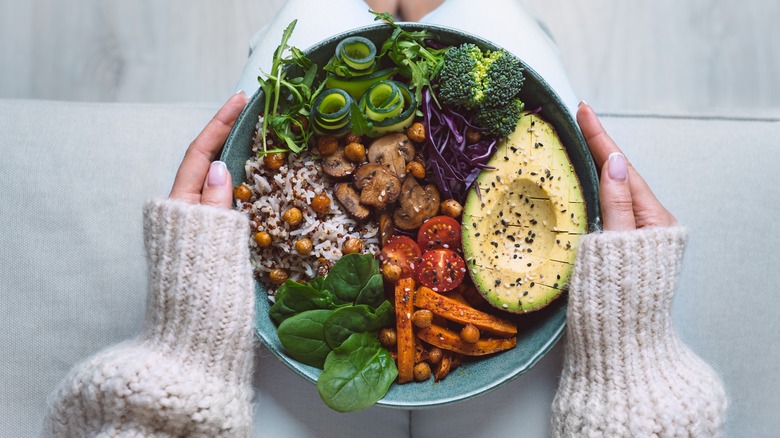How Your Skin Changes When You Stop Eating Meat
You probably have a friend or family member who praises giving up meat. Maybe you've tried going meatless for a while until you had to indulge in turkey on Thanksgiving or a hamburger at a cookout. Swapping out meat for plant-based proteins and other healthy foods can benefit your health, according to WebMD. Red and processed meats can often lead to inflammation, so giving up these meats could cool inflammation that leads to diseases. Eating fiber-rich foods rather than meat can fuel the good bacteria in your gut. This added fiber also helps move waste and toxins through your colon.
Giving up your beloved bacon might also be good for your skin. According to Premier Dermatology, the antibiotics and hormones in processed meats can disrupt your body's hormonal balance and cause your skin to break out. The leucine in beef and chicken stimulates the production of oil on your skin. Processed meats also have sodium nitrates that break down the collagen and elastin in your skin, resulting in your skin's premature aging. The sodium in processed meats also robs your skin of its necessary hydration. When you stop eating meat and start eating plant-based foods, you might notice clearer skin as your body naturally detoxifies impurities (per Lifehack).
Plant-based foods are good for your skin
A 2022 narrative review in the Journal of the Academy of Nutrition and Dietetics said that when diets lack certain nutrients, you could experience thickening skin, poor wound healing, and dermatitis. Because plant-based foods are rich in polyphenols, carotenoids, and certain vitamins, you can improve the health and function of your skin. Diets emphasizing vegetables, olive oil, and legumes are correlated with reduced skin damage and wrinkles, while diets high in meat, refined grains, snacks, soft drinks, coffee, and alcohol are linked to increased wrinkling.
Fruits and vegetables have these healthy compounds that make your skin healthy by defending against free radicals, maintaining your skin's structure, and reducing inflammation related to sun damage. Vitamin C boosts collagen synthesis and can reduce wrinkles. Nuts and legumes have healthy fats and plant-based proteins that can reduce your skin's aging. In particular, polyunsaturated fats found in flax seeds and walnuts have been shown to reduce skin aging in women.
Stick to healthy foods for healthy skin
Meat isn't completely terrible for your health. Meat provides your necessary B vitamins and your essential amino acids. You can still get these from plant-based sources, but you'll have to plan your diet a little more carefully to ensure you're getting these nutrients. Rather than quit eating your turkey cold turkey, give your body a few weeks to adjust by going meat-free a few days a week (per Real Simple).
Giving up meat from your diet doesn't give you the liberty to feed your body with high-sugar baked goods, highly processed snacks, and vegetarian convenience dinners. Just because something is meat-free or vegan doesn't necessarily mean it's healthy. Oreos are technically vegan (per The Minimalist Vegan). To improve your skin's health, you'll need to turn to whole foods to battle free radicals and ward off potential damage (per The Healthy). At first, the hormones in your body might be confused by the change in your diet, so you might experience some breakouts. Eventually, you should see a healthy difference in your skin.



